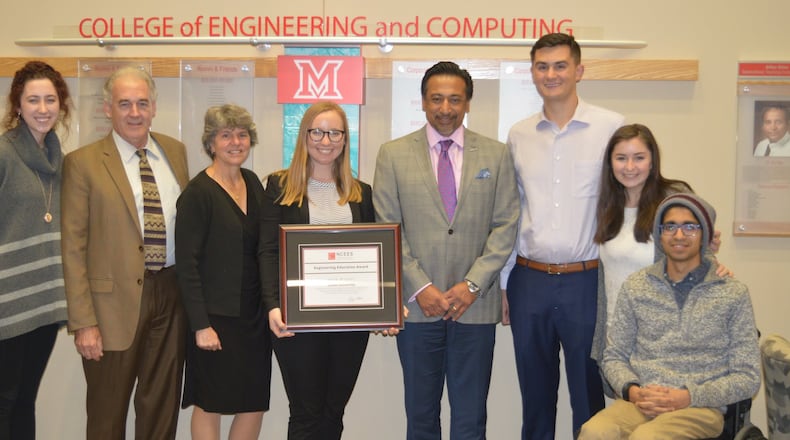The student group collaborates with professionals to take on both local and international projects and was one of eight schools recognized for the award from engineering schools across the country. The award recognizes college engineering programs who engage in collaborative projects between engineers and students.
Although the award was actually announced in early June, the formal presentation was made Oct. 23 by Ferzan Ahmed, representing the NCEES.
Ahmed said he grew up in Pakistan where open sewers overflowed during torrential rain of the rainy season, creating unhealthy conditions and poor drinking water. He said they used boiling and iodine to make the water somewhat safer to use but he understands the need in Uganda and praised the Engineers Without Borders members for their work in this project.
“People are enriched by it. Local residents are enriched by it. This is a very meaningful project. (Water) is one of the basic needs we take for granted in Southwestern Ohio,” Ahmed said. “Collaboration does those kinds of things that change the world. You are one person. To the people you help, you are the world.”
MORE: More Butler County children find Big Brother, Big Sister thanks to grant for video
The student team is planning on using the award money to cover infrastructure costs for the water pumping system they designed. They are looking into items such as concrete, piping and solar panels that could aid their future success of their water system.
The award was the result of an academic poster and paper competition by the NCEES.
EWB vice president junior mechanical engineering student Brent Reichert said the project stood out in the judging because of several factors.
“Our project was unique. A lot of schools were doing water-based projects, but they were not as involved as ours. Our humanitarian-based project worked with professional mentors and got their advice for every step,” Reichert explained in a university press release in June about the award.
In addition to Reichert, Becca Kheiry, Lucy Rukstales, Anne Poindexter, and Lexie Adams helped create the submission for this award.
Poindexter, president of Engineers Without Borders, said she appreciates the support the organization receives from mentors and the university, citing efforts by faculty mentor Cathy Almquist and engineering mentor Mike Brunner, as well as support by the office of the dean.
“We are really so lucky at Miami, investing in our education inside and outside the classroom,” she said at the Oct. 23 meeting when the award was presented. Looking at the organization’s members in the audience, she added, “You are going to make this happen.”
Reichert said the project took off during a spring break trip members took to Uganda his freshman year and praised the work of EWB members in planning and designing the water pumping project.
MORE: Township secures funds to protect firefighters from respiratory disease, cancer
“We have some of the most motivated students on this campus,” he said, explaining water needed by the community needed to be pumped to higher ground and then dispensed around the community with taps located all around. “The project serves mainly kids in schools.”
While this project serves people halfway around the world with just getting the water they need to them, Engineers Without Borders serves with projects closer to home, as well.
Gillian Murphy, the group’s local projects manager, said they have also worked with the Institute for Food on the Miami Campus with an irrigation project used to water food grown on their farm for local distribution.
About the Author
